Opportunities for Women in Peacekeeping: Policy Series
Overview
This policy brief series addresses salient issue areas in MOWIP assessments that emerge as barriers, or opportunities (or both), to women in peacekeeping. It aims to debunk policy myths that have failed to generate systemic change in peacekeeping and to introduce new narratives, based on fresh evidence and research findings across MOWIP data, that identify clear ways forward for key policy actors.
Overall, the series aims to promote a shift in policy frameworks and its corresponding policy actions, from “increasing participation” (in numbers) to “increasing meaningful participation” (via the transformation of structures, practices, and attitudes).
The series comprises seven policy briefs. They are available in English, French, Spanish and Arabic.

Policy Brief 1A: The Duty of Caring
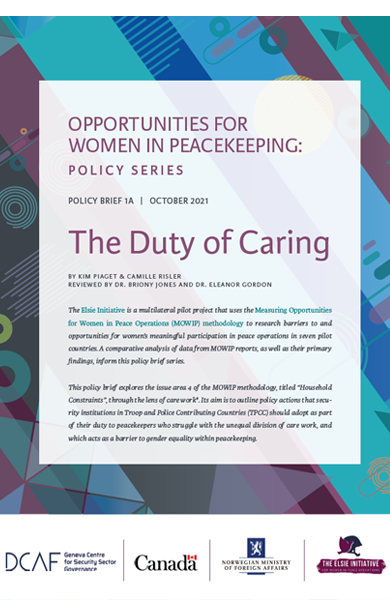 This policy brief outlines policy actions that security institutions in Troop and Police Contributing Countries (TPCC) should adopt as part of their duty to peacekeepers who struggle with the unequal division of care work, and which acts as a barrier to gender equality within peacekeeping.
This policy brief outlines policy actions that security institutions in Troop and Police Contributing Countries (TPCC) should adopt as part of their duty to peacekeepers who struggle with the unequal division of care work, and which acts as a barrier to gender equality within peacekeeping.

Policy Brief 1B: Caring for Carers in International Organisations
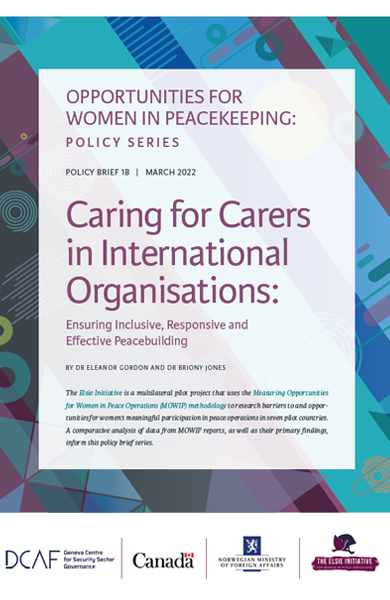 This policy brief argues that addressing the needs of employees with caring responsibilities must be a priority for international organisations engaged in peacebuilding efforts. Read together with Policy Brief 1A, The Duty of Caring, it strengthens an overarching policy argument to address caring responsibilities as part of the Women, Peace and Security agenda.
This policy brief argues that addressing the needs of employees with caring responsibilities must be a priority for international organisations engaged in peacebuilding efforts. Read together with Policy Brief 1A, The Duty of Caring, it strengthens an overarching policy argument to address caring responsibilities as part of the Women, Peace and Security agenda.

Policy Brief 2: Old Expectations, New Challenges: What we look for in a peacekeeper and why it matters
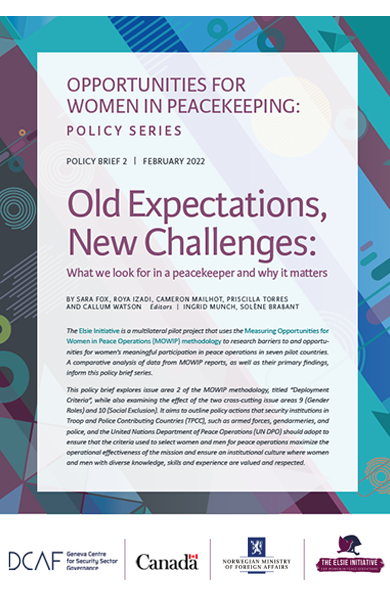 This policy brief outlines policy actions that security institutions in Troop and Police Contributing Countries and the UN Department of Peace Operations should adopt to ensure that selection criteria for peace operations maximize the operational effectiveness of the mission while contributing to an institutional culture where diverse women and men are valued and respected.
This policy brief outlines policy actions that security institutions in Troop and Police Contributing Countries and the UN Department of Peace Operations should adopt to ensure that selection criteria for peace operations maximize the operational effectiveness of the mission while contributing to an institutional culture where diverse women and men are valued and respected.

Policy Brief 3: Organizational culture reboot
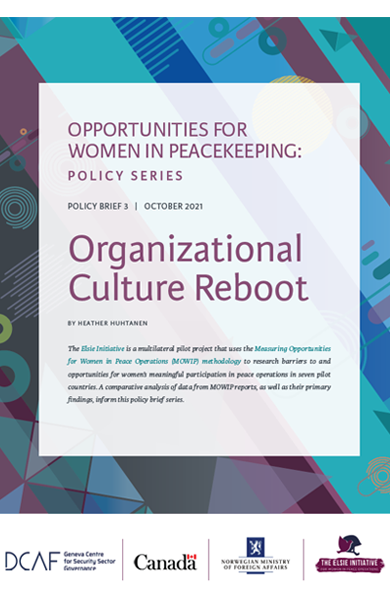 This policy brief highlights the changes in leadership, policy and practice that are needed to counter rigid gender roles and the social exclusion of women in security institutions and in UN peace operations, and to strengthen inclusive and fit-for-purpose organizational cultures.
This policy brief highlights the changes in leadership, policy and practice that are needed to counter rigid gender roles and the social exclusion of women in security institutions and in UN peace operations, and to strengthen inclusive and fit-for-purpose organizational cultures.

Policy Brief 4: Action and accountability: the MOWIP methodology as a tool for equality
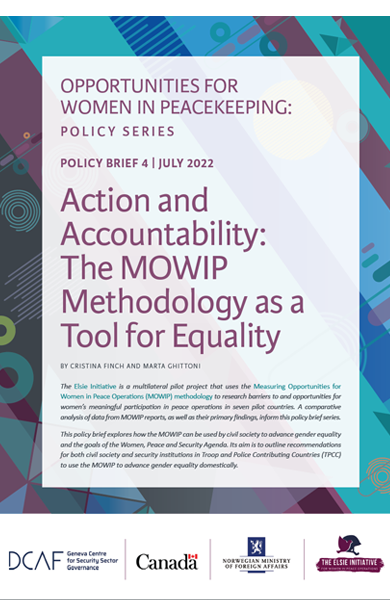 This policy brief explores how the MOWIP can be used by civil society to advance gender equality and the goals of the Women, Peace and Security Agenda domestically. Civil society can use the Information contained in the MOWIP assessments to hold governments to account on their national gender equality commitments.
This policy brief explores how the MOWIP can be used by civil society to advance gender equality and the goals of the Women, Peace and Security Agenda domestically. Civil society can use the Information contained in the MOWIP assessments to hold governments to account on their national gender equality commitments.

Policy Brief 5: Saving the world, one gender training at a time
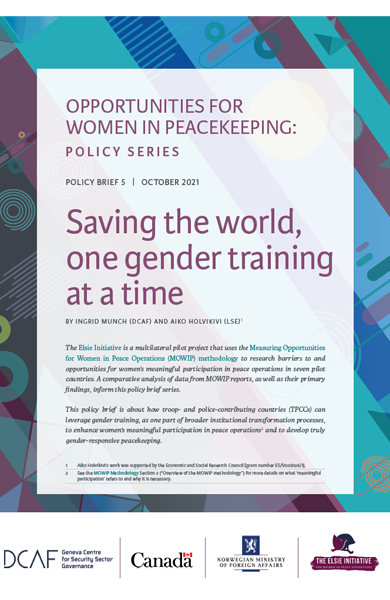 This policy brief is about how troop- and police-contributing countries (TPCCs) can leverage gender training, as one part of broader institutional transformation processes, to enhance women's meaningful participation in peace operations and to develop truly gender-responsive peacekeeping.
This policy brief is about how troop- and police-contributing countries (TPCCs) can leverage gender training, as one part of broader institutional transformation processes, to enhance women's meaningful participation in peace operations and to develop truly gender-responsive peacekeeping.

Policy Brief 5 Annex: Measuring and documenting the contribution of gendertraining to transforming peacekeepers’ mindsets and behaviours
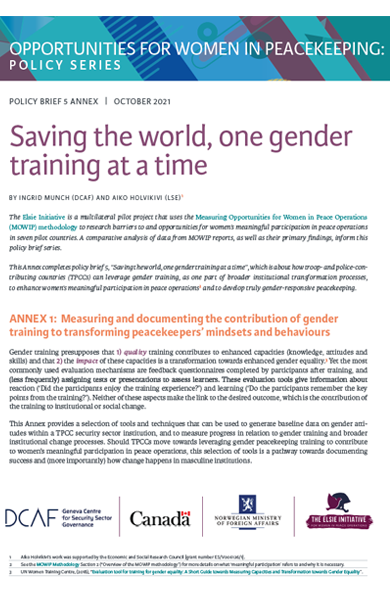 This Annex to Policy Brief 5 provides a selection of tools and techniques that can be used to generate baseline data on gender attitudes within a TPCC security sector institution, and to measure progress in relation to gender training and broader institutional change processes.
This Annex to Policy Brief 5 provides a selection of tools and techniques that can be used to generate baseline data on gender attitudes within a TPCC security sector institution, and to measure progress in relation to gender training and broader institutional change processes.

Policy Brief 6: Peace operations still exclude women, but A4P+ can change that
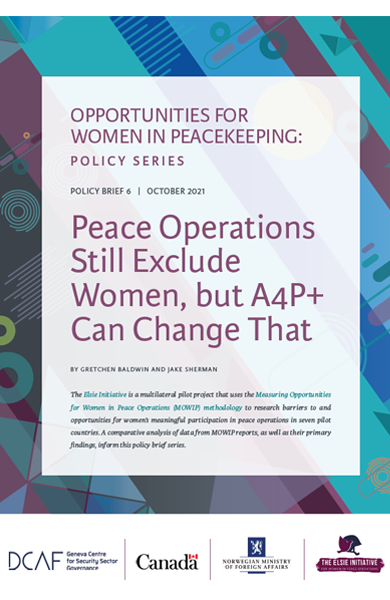 This policy brief details how the UN and member states supporting the Action for Peacekeeping (A4P+) initiative can apply a cross-cutting gender approach to bring about lasting change to the A4P+ seven priority areas, thus improving the effectiveness, efficiency, and relevance of UN Peacekeeping going forward.
This policy brief details how the UN and member states supporting the Action for Peacekeeping (A4P+) initiative can apply a cross-cutting gender approach to bring about lasting change to the A4P+ seven priority areas, thus improving the effectiveness, efficiency, and relevance of UN Peacekeeping going forward.
You can learn more about DCAF’s involvement in the Elsie Initiative, and find the published MOWIP country reports, on DCAF Elsie Initiative webpage. The MOWIP methodology is the standard methodology for the assessments that have informed the present policy briefs series.